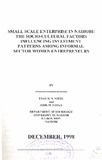Small scale enterprise in Nairobi: the socio-cultural factors influencing investment patterns among informal sector women entrepreneurs

View/
Date
1998-12Author
Njeru, Enos H N
Njoka, John M.
Type
ArticleLanguage
enMetadata
Show full item recordAbstract
Introduction
Many developing countries experienced remarkable economic growth before
the 1970's. In the 1970's, however, it became increasingly clear that
economic growth based on support to the formal sector per se was of little
or no benefit to the populations in question. This underscored the need to
support the informal sector. By addressing such problems as limited access
to land, credit, education and employment opportunities, among a host of
other considerations, the informal sector tends to facilitate more access to
basic needs (Kamunge, 1990).
A variety of views have been noted regarding the definition of the informal
sector, but most scholars and researchers tend to agree on a number of
characteristics that distinguish the informal from the formal sector. These
include: use of simple technology. family ownership of the enterprise,
common use of family labour in the production process, ease of entry and
small-scale operation (ILO, 1972).
Attempts have also been made to differentiate the informal sector from the
small scale enterprise. Masinde and Nzioki (1991), for example, have argued
that while the informal sector caters for the self-employed, operating with
simple hand tools and often without permanent business premises, the small
scale (and micro) enterprise is frequently defined as a small industry,
established as a registered/licenced business in a permanent place of business
and often employing two or more individuals. This distinction may require
further articulation, given that there are many "formalized businesses" falling
under the informal sector category. There are also many businesses, fitting
the above description of small industry, which are by all means "small" and
are yet to be registered. The consensus has been a tendency to use the two
concepts interchangeably, given that, in practice, many informal sector
businesses are also small scale establishments.
In Kenya there is widespread support for the informal sector, given its
benefits and in view of the growing need to create more jobs. Thus the
Kenya Government (GoK) has directly encouraged the promotion of the
small enterprise and supported the "Jua Kali" programme through the Kenya
Industrial Estates. Over-emphasis on economic aspects has, however,
resulted in inadequate attention being given to some critical socio-cultural
and economic constraints against expansion and growth of entrepreneurs in
this sector (K-REP, 1991; K-REP/GEMINI, 1991). Yet the economic and
non-economic factors have complementary functions in the development of
small scale enterprise. "
Some structural and gender focused efforts such as those manifest in women
in development programs have, for instance, supported participation of
women in basic income generating activities through informal sector
programmes which are largely welfare-oriented, operating at the subsistence
level of production and designed to cater more for enhanced confidence and
awareness than to create sustainable profit centers. Such programmes are
based on the premise that women can successfully develop themselves along
the traditionally welfare-oriented roles.
On a more balanced presentation, however, one of the popularly cited
benefits of the small enterprise development programs has been their
tendency to cater equally for the needs of both men and women, on the
presumption that entrepreneurs of both sexes experience similar constraints
to business start-up and expansion. The Kenyan social systems are, however,
known to be inherently biased against women, hence giving marginal
attention to women's needs (Kariuki, 1985; Seidman & Anang, 1992). As
such, women face problems that are often qualitatively different from those
encountered by men, with regard, for example, to access to information,
training and credit (K-REP, 1995). Studies by ILO (1984), Keino and Ngau
(1996), Hay and Stitcher (199 I) and UNECA (1990), recognize this but fail
to adequately address the existence and impact of some adverse African
traditions that constitute barriers to women's participation in the informal
sector enterprise, emphasizing instead, the economic forces. Design and
implementation of assistance programs should thus incorporate genderspecific
needs, while noting the nature and impact of the socio-cultural,
economic and other institutional factors which inhibit women's participation
in the informal sector.
Publisher
University of Nairobi Institute of Development Studies (IDS)
